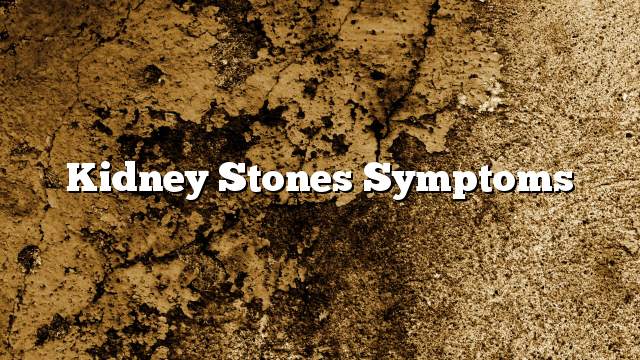Kidneys
Kidneys are one of the most important organs of the body. Blood is purified from waste through urination, as well as its important role in maintaining fluid and mineral balance in the body. The kidneys are located at the back of the abdomen, each about 10 cm long.
Kidney stones
Grains are one of the most common kidney diseases. Studies indicate that one in 10 people die of kidney stones during their lifetime. Men suffer from kidney stones more than women, and three times as many. Between 30 and 45 years old.
Kidney stones are composed of the accumulation of certain substances in the kidneys and their formation into crystals, which are divided according to their constituent material. Most of the gravel originates from the accumulation of calcium, either in the form of a calcium compound, calcite or calcium phosphite. The rest of the gravel consists of other substances, Uric, steroids, and cysteine.
There are many chemical compounds naturally in the urine. These compounds reduce the chance of kidney stones. The most prominent of these compounds are citrate, magnesium and pyrophosphate. If the amount of these elements decreases due to several factors, , And most kidney stones pass through the urinary tract to the outside of the body without resorting to any action, but if the size of these stones enough to close the urethra then it must be treated these stones; it may cause severe pain and continuous, and may cause many damage With kidneys.
Kidney stones symptoms
The sizes vary kidney stones , The small ones rarely cause any symptoms and may come out of the body without any treatment, and may not result from kidney stones any symptoms as well as if they cross from the kidneys to the ureters: the two tubes that transfer urine from the kidney to the bladder, or if caused inflammation Urinary Tract. The most common symptoms associated with kidney stones are as follows:
- Feelings of severe pain: It is known that the pain associated with kidney stones is very severe, and may feel the pain in the abdomen or in the lower abdomen or lower back or pelvic, and these severe pain in the form of fits in the intensity of the intensity, and may extend to feel pain In the testicles, and between these seizures the patient feels relatively mild pain, or feeling uncomfortable at the lower back or in the pelvis.
- Feeling pain or burning when urinating.
- Color and shape of the urine: The color of the urine may become dark or may become red or pink, and often result from the rubbing of the stones of the urinary tract and thus blood drop with urine, and urine may become more intense, and it smells foul.
- The need to urinate constantly, and go to the bathroom frequently.
- Excess amounts of urine compared to the patient’s output.
- Suffering from nausea and vomiting.
- If the kidney stones cause urinary tract infection, then the patient may have other symptoms, such as a high temperature of the patient’s body and thus suffering from chills, as well as feeling tired and exhaustion, as well as suffering from diarrhea.
Factors that increase the chance of kidney stones
Many factors may contribute if you find an increased risk of kidney stones. The most prominent of these factors are as follows:
- The presence of other injuries within the same family, in addition to the injury of the patient previously kidney stones.
- Suffering from dehydration is one of the most common causes of kidney stones. It results from insufficient intake of fluids to reduce the concentration of metals and chemical compounds and prevent their formation.
- Eat some types of foods: especially those rich in protein and sodium.
- Obesity.
- Suffering from diseases of the digestive system, such as: inflammatory colitis, as well as undergo gastrointestinal surgery, in addition to suffering from chronic diarrhea.
- Other diseases, such as thyroid hyperthyroidism, as well as renal tubular encephalopathy, which arise from a decrease in the ability of the kidneys to equate acids, causing a rise in general acidity in the body, and may produce kidney stones from the treatment of some types of drugs.
Treatment of kidney stones
There are many procedures that patients are advised to follow in the event of suffering from pain attacks associated with kidney stones, the patient must drink large amounts of fluids to increase urinary incontinence and to try to get rid of the gravel, and there are many medications that may be taken by the patient, most notably painkillers such as paracetamol and ibuprofen Sometimes antibiotics may be used if the patient has urinary tract infection. If the patient has uric acid kidney stones, medicines that reduce the level of the acid may be used in the body.
One of the methods used to get rid of kidney stones is a process called lithotripsy, which depends on the shedding of certain amounts of these rays on the site of the stone to break them into smaller parts that can pass through the urinary tract to the outside, and this process may cause bruises on the vertebrae or Below the abdomen, and may be resorted under certain circumstances to surgery to get rid of kidney stones, in the event of any damage to kidney or large size of gravel significantly.
